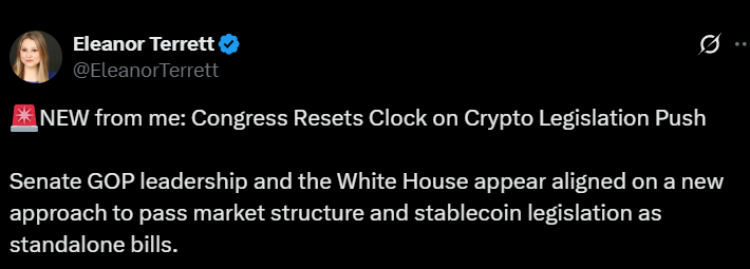Congress is giving itself more time to pass important new rules for cryptocurrencies. Originally facing an August deadline, leaders from the Senate Republicans and the White House have now agreed to push the major cryptocurrency bills separately, which is expected to finish the market rules bill by the end of September.
(Source: Eleanor Terrett on X)
However, it will be a challenge in the Senate to get enough support from both parties. The legislation effort for new crypto regulations faces hurdles in the Senate, where leaders admit it won’t be easy to get enough votes.
Republican Senator Cynthia Lummis compared passing stablecoin rules to “giving dry birth to a porcupine”, which shows how tough it will be to win bipartisan support.
Meanwhile, the White House is pushing for the Senate to finalize its version of the market rules bill by late September. Though its supporters have also admitted that there’s “work to do” to secure the needed votes.
The House is staying quiet about its next steps for a related crypto bill, despite pressure from the White House to avoid changes. If both chambers pass their versions, the final rules could reach President Donald Trump’s desk as early as next month.
But with disagreements still looming, the path to new crypto laws remains uncertain, even as lawmakers race against the clock.
US Congress’s Push for Clear Crypto Regulation
On June 17, the US Senate passed a landmark stablecoin bill in the form of the GENIUS Act with strong bipartisan support. The bill is now waiting for consideration in the House of Representatives.
However, some senators have raised questions on the GENIUS Act. For instance, Senator Elizabeth Warren said, “The GENIUS Act has a major loophole allowing Big Tech companies and major retailers to issue their own private currencies structured as stablecoins. This bill shouldn’t pass without amendments preventing these risks.”
Under the US President Donald Trump’s crypto-friendly administration, the crypto community is expecting a clear regulatory framework that will help crypto innovations thrive in a regulated environment.
The SEC and CFTC recently held a joint roundtable with industry experts to discuss critical challenges in crypto, including digital custody, tokenization, and DeFi regulation.
The meeting aimed to address gaps in oversight, particularly around how traditional financial rules apply to these emerging technologies, but no immediate policy changes were announced.
Regulatory clarity is pushing major banks like Bank of America to embrace crypto, with plans to launch their own stablecoin amid growing institutional demand.
“It’s pretty clear there’s going to be a stablecoin, which is going to be fully dollar-backed… so you’ll have a Bank of America coin and a U.S. Dollar deposit and we’ll be able to move them back and forth because now it hasn’t been legal for us to do it but it’s just like another foreign currency,” says Brian Moynihan, CEO of Bank of America.
Also Read: US to Become Crypto Capital of the World: Senator Tim Scott



